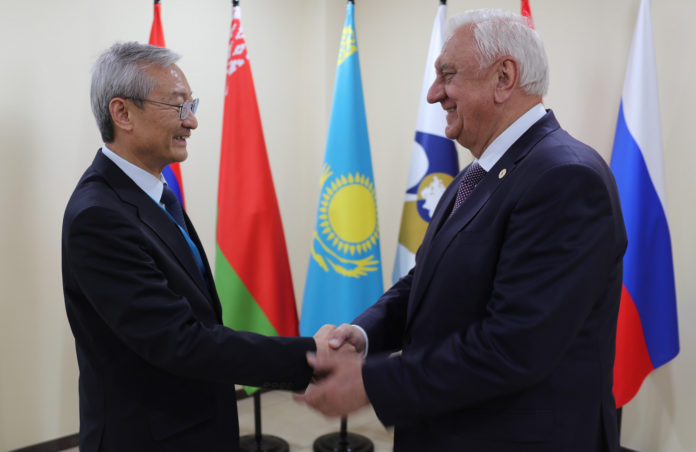
by Riccardo Cacelli
London – Mikhail Myasnikovich, chairman of the Eurasian Economic Commission (EEC), and Zhang Ming, secretary general of the Shanghai Cooperation Organization (SCO) met last March in Moscow to discuss economic cooperation.
The EEC is the governing authority of the Eurasian Economic Union (EAEU), which includes Armenia, Belarus, Kazakhstan, Kyrgyzstan and Russia. It is a free trade group located between the borders of Eastern Europe and Western China.
The EAEU has free trade agreements with China, Iran, Serbia and Vietnam. Several other countries are also negotiating free trade agreements with the EAEU, including Egypt, India and Indonesia.
The SCO comprises eight Member States (China, India, Kazakhstan, Kyrgyzstan, Russia, Pakistan, Tajikistan and Uzbekistan), four observer States interested in full membership (Afghanistan, Belarus, Iran and Mongolia) and six “Dialogue Partners” (Armenia, Azerbaijan, Cambodia, Nepal, Sri Lanka and Turkiye).
In 2021, a decision was made to initiate Iran’s accession process to the SCO as a full member, while Egypt, Qatar and Saudi Arabia became dialogue partners. Proposed new dialogue partners include Bahrain, Maldives, Myanmar, Kuwait and the United Arab Emirates.
The meetings between the two exponents focused on strengthening practical joint work in the transport and logistics sector, as well as on stimulating the integration of foreign exchange payment systems for independent cross-border payments.
According to Myasnikovich, the economic agendas of the SCO and the EAEU have the potential to complement each other and define the global landscape.
Myasnikovich said, “In 2022, the trade turnover between the EAEU and the SCO was $270.2 billion, an increase of more than 40% in 2022.“
Myasnikovich further said, “The Commission had prepared a concept for the implementation of a transport and logistics mega-project designed to connect the territory of the Eurasian region together“.
This project is currently under consideration by the SCO.
Both Myasnikovich and Zhang stressed the importance of increasing mutual settlements in national currencies and collaborating on the development of integrated currency payment systems for independent cross-border payments, trade and investment financing.
Commenting about this, Myasnikovich finally said: “There are good developments in the EAEU, by the end of 2022, the share of settlements within the Union in national currencies amounted to 80%. We believe it is necessary to ensure the synchronization of the potential of the payment and settlement infrastructures of the EAEU and the SCO. We will present our proposals shortly“.
Both sides confirmed their interest in signing the Joint Action Plan for the implementation of the Memorandum of Understanding between the EEC and the SCO Secretariat.
The document is in the final stage of approval and its signature could take place in May this year, most likely on the occasion of the Second Eurasian Economic Forum, which will be held on May 24-25 in Moscow.
A special session “EAEU – SCO – BRICS: Open Integration Dialogue” will be held during the Forum. These discussions are important as they anticipate the likelihood of an eventual merger of the Eurasian Economic Union with the Shanghai Cooperation Organization and an enlargement of the BRICS.
A new “multipolar” world order is looming on the horizon.
Who does not see it is the “West” public opinion and its entrepreneurs too busy to maintain the status quo considering the rest of the world rubbish.
But is not so’. And it won’t be like that.
Meantime Algiers, Egypt, Nigeria, Sudan and Zimbabwe are among the African countries showing interest in joining the BRICS.
PART 1 OF 5 – PART 2 OF 5 – PART 3 OF 5 – PART 4 OF 5


